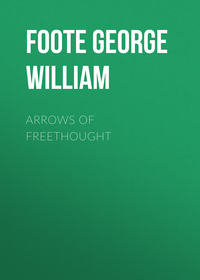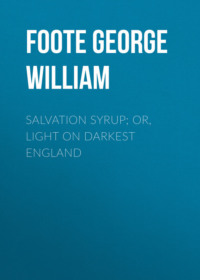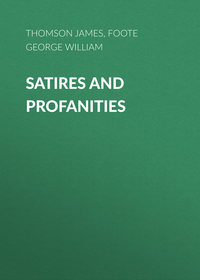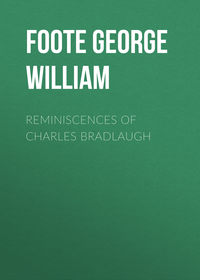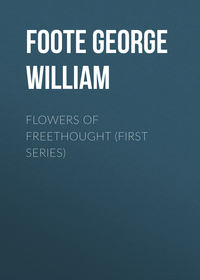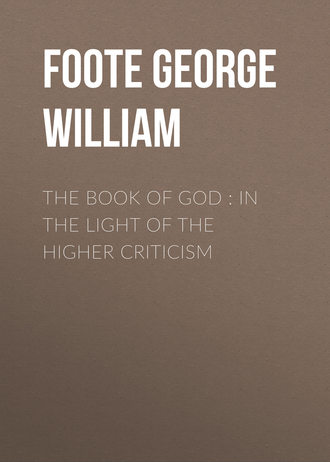
The Book of God : In the Light of the Higher Criticism
We need not follow Dr. Farrar in his rhapsodical references to the various achievements of the Bible. We may remark, however, that his reference to Japan is singularly unhappy. That country has accepted the leading ideas of Western civilisation, but it has not accepted Christianity. Nor is Dr. Farrar well advised in laying so much stress on the Pilgrim Fathers. He says that they had a preference for the "pure, unadulterated lessons of the Bible." Perhaps they had. But what were those lessons as illustrated by their actions? Certainly intolerance was one of them. They had no conception of religious liberty. "The Pilgrim Fathers," as Sir Walter Besant remarks in his little book on The Rise of the Empire, "believed that everybody should think as they themselves thought. Had they achieved their own way, they would have sent Laud himself, and all who thought like him, across the ocean with the greatest alacrity." They also believed in witchcraft, probably because Dr. Farrar was not at hand to explain that the Bible did not mean what it said; and they tortured and burnt witches with remarkable gusto.
It would also be a waste of time to correct all Dr. Farrar's statements about the influence of the Bible in other directions. We will take a single illustration of his fantastical method. He tells us that the Bible "inspired the pictures of Fra Angelico and Raphael, the music of Handel and Mendelssohn." Perhaps he will tell us whether it inspired Raphael's picture of the Fornarina, and why it did not inspire the music of Beethoven and Wagner. Both those great composers, as a matter of fact, were "infidels."
Nothing could be more absurd than orthodox talk about the Bible "inspiring" great poets, artists, and musicians. Men of genius are inspired by nature. Their inspiration is born with them. It cannot be made; it can only be utilised. All that religions have done is to employ the genius they could not create. Every religion has done this in turn. The genius was there always as a natural endowment. It existed before all the world's religions, and it will outlive them.
VIII. INSPIRATION
The Higher Criticism, as expounded by Dr. Farrar, admits nearly all the Bible difficulties that have been advanced by "infidels." Let us recapitulate the most important. The Bible is hopelessly at variance with science. It sometimes contradicts well-established history. Many of its stories, taken literally, are obviously absurd. Some of the actions it records with apparent approval are wicked or disgusting. A good deal of its language sins against common decency. Several books were not written by the authors whose names they bear. Others are, and must for ever remain, anonymous. The dates of composition of the various books are not what has been generally supposed. Occasionally the true chronology differs from the received chronology by many centuries. To the great majority of readers the Bible has never been known, and never can be known, except in translations. No translation can possibly be perfect. Every translation of the Bible is known to contain grave and numerous errors. Even in the original Hebrew and Greek manuscripts there are thousands of various readings. In some cases the text is uncertain, in some cases interpolated, and in others irrecoverably impaired. The vowel points by which Hebrew is now read are demonstrably a modern invention. Even the discourses of Jesus Christ, in the New Testament, are not reported with accuracy. The New Testament writers seldom quote from the Old Testament exactly, but generally rely upon the Greek translation called the Septuagint.
Sometimes they quote passages which are not in Scripture at all. "Out of 288 passages quoted from the Old Testament in the New," says Dr. Farrar, "there are but 53 which agree accurately with the original Hebrew. In 76 the New Testament differs both from the Greek and the Hebrew; and in 99 the New Testament, the Greek, and the Hebrew are all variant."
On the face of it, then, the Bible is doomed. A book of which all these things can be said, without the slightest fear of contradiction, must sooner or later be dropped as the Word of God. It will be recognised as a human composition.
Meanwhile, those who live by the Bible, and are professionally interested in its "supremacy," as Dr. Farrar calls it, cast about a for means of giving it a fresh reputation. The old conception of it is fatally discredited; a new one may give it a fresh lease of life.
Evidently there is only one direction open to the theological trimmers. They must start another theory of inspiration – one that will conserve the "sacred" character of the Bible in spite of every difficulty that has been, or can be discovered.
The Bible is no longer to be called the Word of God. Ruskin says, and Dr. Farrar seems to quote it approvingly, that "it is a grave heresy (or wilful source of division) to call any book, or collection of books, the Word of God." Ten pages later, however, we are told that the Bible, as a whole, may be spoken of as the Word of God, because it "contains words and messages of God to the human soul." This word "contains" is the magical spell by which Dr. Farrar seeks to dissipate all difficulties. He finds the expression in the Church Articles, in the Book of Homilies, and in the Shorter Catechism. But in order to see how illegitimate is Dr. Farrar's use of these authorities, let us take his extract from the last of them: "The Word of God which is contained in the Scriptures of the Old and New Testament is the only rule to direct us how we may enjoy and glorify Him." Is it not clear that the word "contained" is used here in its primary meaning? Did not the writers mean that the Word of God is included or comprehended in the Old and New Testament only, and is not to be found elsewhere? Would they not have been shocked to hear a clergyman of the Church of England say that some parts of the Bible were not the Word of God? If so, their use of the word "contain" lends no countenance to the use made of it by Dr. Farrar. And is it not a shallow trick upon our intelligence to argue that different persons, using the same word, necessarily mean the same thing? Words are the money of fools, as Hobbes said, but only the counters of wise men. We must get at the actual value of the thing which is symbolised. And the moment we do this, we see that Dr. Farrar's theory of the Word of God is not the same as that of the gentlemen who drew up the Shorter Catechism. They would indeed have laughed at his "contains," and excommunicated and imprisoned him, and perhaps burnt him at the stake. It is not by torturing one poor word ten thousand ways that such wide differences can be reconciled.
Passing by this ridiculous legerdemain, let us take Dr. Farrar's theory for what it is worth. The Bible contains the Word of God. But how are we to find it? What is the criterion by which we are to separate God's word from man's word? Dr. Farrar bids us use "the ordinary means of criticism and spiritual discernment." But such a vague generality is nothing but verbiage. What we want is the criterion. Now the nearest approach to it in all Dr. Farrar's pages is the following: —
"Is it not a plain and simple rule that anything in the Bible which teaches, or is misinterpreted to teach, anything which is not in accordance with the love, the gentleness, the truthfulness of Christ's Gospel, is not God's word to us, however clearly it stands on the page of Scripture?"
This is at best a negative criterion; and, on close examination, it turns out to be no criterion at all. The criterion, to be valid, must be external to the book itself. Dr. Farrar's criterion is internal. He picks out one part of the Bible as the standard for judging all the rest. This is entirely arbitrary. Moreover, it would soon be found impossible in practice. Dr. Farrar's criterion may be "plain," but it is not so "simple," except in the uncomplimentary sense of the word. For "Christ's Gospel," by which the rest of the Bible is to be tried, is itself a very composite and self-contradictory thing. Further, if all that agrees with Christ's Gospel is the Word of God, is it not superfluous as being a mere repetition? Dr. Farrar would therefore bring the actual, valid Word of God within the compass of the Four Gospels; dismissing all the rest, like the Arabian Caliph who commanded a whole library to be burnt on the ground that if the books differed from the Koran they were pernicious, and if they agreed with it they were useless. Nor is this all. Dr. Farrar admits that the discourses of Jesus Christ are not reported with accuracy. Therefore, having made the Gospels the criterion of the Word of God in the rest of the Bible, he would be obliged to select some special passages as the criterion of the Word of God in the rest of the Gospels. This is what Shakespeare would call a world-without-end process.
Candidly, it seems to us that if the Bible is not the Word of God, but only contains the Word of God – that is to say, if it is partly God's word and partly man's word – the clergy of all denominations should unite in publishing a Bible with the divine and human parts clearly specified by being printed in different types. And surely, if the Bible is in any sense inspired, it should be possible, by a new and final act of inspiration, to settle this distinction for ever.
Allowing the clergy to meditate this holy enterprise, we proceed to consider Dr. Farrar's theory of inspiration. Of course he discards the old theory of verbal dictation; indeed, he calls it "irreverent," because it attributes to God what modern men of intelligence and good manners would be ashamed to own. He even quarrels with the very term inspiration as "vague," and says it would be "a boon if some less ambiguous word could be adopted." Four theories, he says, have been entertained in the Christian Church. The first is the mechanical theory, which implies that the Holy Ghost dictated, and the inspired penmen were merely his amanuenses. The second is the dynamic, which recognises "the indefeasible guidance of the Holy Spirit." The third is that of illumination, which confines the divine guidance to matters of faith and doctrine. The fourth is that of general inspiration, which regards the Holy Spirit as influencing the writers in the same way as it influences "other noble and holy souls." This fourth theory is the one which Dr. Farrar himself affects. Every pure and sweet influence upon the human soul, he says, is a heavenly inspiration. We owe to it "all that is best and greatest in philosophy, eloquence, and song." Haydn said of his grandest chorus in the "Creation": "Not from me but from above it all has come!" "There is inspiration," says Dr. Farrar, "whenever the spirit of God makes itself heard in the heart of man." Apparently – for we can never be quite sure of Dr. Farrar – the only superiority of the Bible lies in the fact that "the voice of God" speaks to us "far more intensely" out of it than out of "any [other?] form of human speech."
Such a theory of inspiration is too vague and universal. Sooner than give up inspiration altogether Dr. Farrar is prepared to share it all round. But is not proving too much as bad as proving too little? If the Bible is only inspired – where it is inspired – in the same sense as other books are inspired; if the difference is not one of kind, but simply of degree; then it is really idle to talk about its inspiration any longer. The word inspiration loses all its original meaning. It becomes a poetical expression, implying nothing supernatural, but merely the exaltation of natural powers and faculties. God is then behind the Bible only as God is behind everything; and Christianity, ceasing to be a special revelation, becomes only a certain form of Theism.
This loose theory of general inspiration will doubtless serve the present turn of the clergy, who have to face a general and growing dissatisfaction with the Bible. But it cannot live very long in a scientific age. It will be found out in time, like all the Bible theories that preceded it. The first Protestant dogma was the infallibility of Scripture. That was exploded by modern science and textual criticism. Then came the dogma of plenary inspiration, which had a comparatively short-lived existence, as it was only the old dogma of infallibility in disguise. Next came the dogma of illumination, which may be said to have begun with Coleridge and ended with Maurice. Finally, we have the dogma of general inspiration, which began nowhere and ends nowhere, which means anything or nothing, and which is a sort of "heads we win, tails you lose" theory in the hands of the clever expounders of the Higher Criticism.
Behind the last, as well as the first, of all these theories of inspiration stands the fatal objection of Thomas Paine, that inspiration, to be real, must be personal. A man may be sure that God speaks to him, but how can he be sure that God has spoken to another man? He may think it possible or probable, but he can never be certain. What is revelation at first-hand, said Paine, is only hearsay at second-hand. Real inspiration, therefore, eventuates in mysticism. The inner light shines, the inner voice speaks; God holds personal communication with the individual soul. Each believer carries what the author of Hudibras calls "the dark lanthorn of the spirit," which "none see by but those who bear it." And the very multiplicity and diversity of the oracle's deliverances are a proof that in all of them man is speaking to himself. He questions his gods, and hears only the echo of his own voice.
IX. THE TESTIMONY OF JESUS
Some of the teaching of the Higher Criticism as to the authorship and credibility of the Old Testament is, on the face of it, contrary to the plain language of Jesus Christ himself in the Gospels. Moses, for instance, is no longer considered as the author of the Pentateuch. Canon Driver, who is perhaps the chief scholar of this movement in the Church of England, as Dean Farrar is perhaps its chief rhetorician, locates the composition of the book of Deuteronomy in the period between Isaiah and Jeremiah. Throughout the book, he observes, the writer introduces Moses in the third person, and puts speeches in his mouth which of course he never uttered. But in "framing discourses appropriate to Moses' situation!" he was not guilty of "forgery," for he was "doing nothing inconsistent with the literary usages of his age and people." That is to say, everybody did it, and this writer was no worse than his contemporaries – which is probably true. But passing by the question of casuistry here involved, we repeat that the Mosaic authorship of the Pentateuch is entirely abandoned. Dr. Farrar is quite as emphatic as Dr. Driver on this point. He denies that there is "any proof of the existence of a collected Pentateuch earlier than the days of Ezra (b.c. 444 )" – a thousand years after the time of Moses. He points out that the salient features of the so-called Mosaic Law, such as the Passover, the Sabbatical year, and the Day of Atonement, are not to be traced in the old historical books or in the earlier prophets. Nor does he scruple to assert that the Pentateuch is "a work of composite structure," which has been "edited and re-edited several times," and "contains successive strata of legislation." In the New Testament, however, Moses is repeatedly spoken of as the author of the Pentateuch.6 Not to multiply texts, for in such a case one is as good as a thousand, we will take a decisive passage in the fourth Gospel: —
"Do not think that I will accuse you to the Father. There is one that accuseth you, even Moses, in whom ye trust. For had ye believed Moses, ye would have believed me: for he wrote of me. But if ye believe not his writings, how shall ye believe my words?" (John v. 45-47).
The speaker in this instance is Christ himself. It is he, and not the evangelist, who speaks of the writings of Moses, and declares that Moses "wrote of me."
Now let us turn to the book of Psalms, which has been well called the Hymn Book of the Second Temple. According to Dr. Farrar, they are "a collection of sacred poems in five separate books of very various antiquity." Canon Driver points out that they are mostly posterior to the prophetical writings. "When the Psalms," he says, "are compared with the prophets, the latter seem to show, on the whole, the greater originality; the psalmists, in other words, follow the prophets, appropriating and applying the truths which the prophets proclaimed." Very few of the Psalms are earlier than the seventh century before Christ. Dr. Driver affirms this with "tolerable confidence." Dr. Farrar says that "some may mount to an epoch earlier than David's," but this is mere conjecture. The more cautious Dr. Driver will not commit himself further than "a verdict of non liquet"; that is to say, there is no proof that David did not write one or two of the Psalms, and no evidence that he did. His name was associated with the collection, in the same way as the name of Solomon was associated with the Proverbs. Nevertheless it is David who is referred to by Jesus as the author of the hundred-and-tenth Psalm.7 But this Psalm is one of those which are allowed to belong to a much later period. Jesus quoted it as David's, but Professor Sanday says "it seems difficult to believe it really came from him"8 – which is as strong an expression as a Christian divine could be expected to permit himself in a case of such delicacy.
We have already seen that the book of Daniel was not written by the prophet Daniel, but by some unknown author hundreds of years later, probably in the second century before Christ. Upon this subject Professor Sanday takes precisely the same view as Canon Driver. He says that this is "the critical view" and has "won the day." All the facts support the "supposition that the book was written in the second century b.c.," and not "in the sixth." "The real author," he says, "is unknown," and "the name of Daniel is only assumed." He was writing, not a history, but a homily, to encourage his brethren at the time of the Maccabean struggle. "To this purpose of his," Professor Sanday says, "there were features in the traditional story of Daniel which appeared to lend themselves; and so he took that story and worked it up in the way which seemed to him most effective." Jesus Christ, however, held the orthodox view of his own time, and spoke of Daniel as the actual author of this book (Matthew xxiv. 15). "But this," Professor Sanday observes, "it is right to say, is only in one Gospel, where the mention of Daniel may be an insertion of the Evangelist's." Such conjectural shifts are Christian critics reduced to in their effort to minimise difficulties; as though reducing the mistakes of Jesus in any way saved his infallibility.
We will now turn to some portions of the Old Testament narrative which the Higher Criticism regards as legendary, but which Jesus regarded as strictly historical. One of these is the story of the Flood. No one of any standing is now prepared to defend this story, at least as we find it in the book of Genesis. A few orthodox scientists, like Sir James W. Dawson, pour out copious talk about tremendous floods in former geological ages; but what has this to do with the Bible narrative of a universal deluge which occurred some four thousand five hundred years ago? The Higher Critics have the impatience of Freethinkers with such intellectual charlatanry. They regard the story of the Flood as a Jewish legend, which was not even original, but borrowed from the superstitions of Babylon. Yet the opinion of Jesus Christ seems to have been very different. Here are his own words: —
"But as the days of Noe were, so shall also the coming of the Son of Man be. For as in the days that were before the flood they were eating and drinking, marrying and giving in marriage, until the day that Noe entered into the ark, and knew not until the flood came, and took them all away, so shall also the coming of the Son of man be" (Matthew xxiv. 37-39).
Jesus Christ appears to have believed, like the disciples he was addressing, like all the rest of his countrymen, and like nearly all Christians until very recently, that the Flood was an historical occurrence, that Noah and his family were saved in the ark, and that all the other inhabitants of the world were drowned.
Another story which the Higher Criticism dismisses as legendary is that of Jonah. The book in which it is related was, of course, not written by Jonah, the son of Amittai, of whom we read in 2 Kings xiv. 25, and who lived in the reign of Jeroboam II. "It cannot," as Dr. Driver says, "have been written until long after the lifetime of Jonah himself." Its probable date is the fifth century before Christ. Dr. Driver says it is "not strictly historical " – that is to say, the events recorded in it never happened. Jonah was not really entertained for three days in a whale's belly, nor did his preaching convert the whole city of Nineveh. The writer's purpose was didactic; he wished to rebuke the exclusiveness of his own people, and to teach them that God's care extended, at least occasionally, to other nations as well as the Jews. Some critics, such as Cheyne and Wright, regard the story as allegorical; Jonah standing for Israel, the whale for Babylon, and the vomiting up of the prophet for the return of the Jews from exile. Dr. Farrar draws attention to the "remarkable" fact that in the book of Kings "no allusion is made to any mission or adventure of the historic Jonah." He adds that there is not "the faintest trace of his mission or its results amid the masses of Assyrian inscriptions." Even the writer of the book of Jonah, according to Dr. Farrar, attached "no importance" to its "supernatural incidents," which "only belong to the allegorical form of the story." So much for the Higher Critics; and now let us hear Jesus Christ: —
"An evil and adulterous generation seeketh after a sign; and there shall no sign be given to it, but the sign of the prophet Jonas: For as Jonas was three days and three nights in the whale's belly; so shall the Son of man be three days and three nights in the heart of the earth. The men of Nineveh shall rise in judgment with this generation, and shall condemn it: because they repented at the preaching of Jonas; and behold a greater than Jonas is here" (Matthew xii. 39-41).
This utterance of Jesus is also reported in Luke (xi. 29-32), but with an important variation, the reference to Jonah in the whale's belly being entirely omitted. This variation is seized upon by Dr. Farrar. The fishy reference, he says, occurs in Matthew alone, and it may "represent a comment or marginal note by the Evangelist, or of some other Christian teacher." This, however, is an arbitrary supposition, which everyone is free to repudiate; and Dr. Farrar feels obliged to add that "even if our Lord did allude to the whale" it does not follow that we should regard it as "literal history." But this is not the question at issue. The real question is, did Jesus Christ believe the story of Jonah and the whale? If he did not, it must be admitted that he had a most unfortunate way of expressing himself.
No educated Christian in the present age believes the story of Lot's wife being changed into a pillar of rock salt, although Josephus pretended that he had seen it, and many travellers and pilgrims have searched for it as a sacred relic. Jesus Christ, however, gave great prominence to this salted lady. "Remember Lot's wife" is a verse by itself in the Protestant Bible (Luke xvii. 32). Jesus also refers to the rain of fire and brimstone by which Sodom was destroyed.
Here then, upon the face of it, we have Jesus Christ's testimony to three documents as having been written by men who did not write them, and to the historical character of three incidents which are purely fabulous. Now the Higher Criticism must be wrong, or else Jesus Christ was mistaken; in other words, he was not infallible, and therefore not God. But the Higher Critics declare that they are not wrong; they also declare that Jesus Christ was not mistaken. Let us see how they try to save their own accuracy and his infallibility.
We must remark, in passing, that some of these critics hint, without exactly asserting, that Jesus may have been mistaken. Dr. Farrar bids us remember that "by the very fact of taking our nature upon him Christ voluntarily submitted himself to human limitations." There were some things which, as a man, he did not know. Yes, but he was also God; and the conjunction of "knowledge" and "ignorance" in one person, and with respect to a single subject, would dissolve the unity of the God-man, which is a dogma of Christian theology. Moreover, as Canon Liddon argued, it is not so much a question of Christ's omniscience as a question of his infallibility. Supposing there were some matters, such as the date of the day of judgment, of which he was ignorant; he might confess his ignorance or remain silent, and no harm would accrue to anyone; but if he spoke upon any matter, and was mistaken through want of knowledge, he would become a propagator of error; and this would not only destroy the doctrine of his deity, but very seriously impair his authority as a teacher, and cause everything he said to be open to the gravest suspicion. No less dangerous is it to fall back upon the explanation that "the discourses of Christ are not reproduced by the Evangelists with verbal identity" – to use Dr. Farrar's own language. Dr. Sanday seems a little attracted by this explanation. He reminds us that, whatever views Jesus himself entertained as to the Scriptures of the Old Testament, his views have come down to us through the medium of persons who shared the erroneous ideas that were then current on the subject. We must be prepared, he says, for the possibility that Christ's sayings in regard to it "have not been reported with absolute accuracy." But after all "not much allowance" should be made for this; which means, we suspect, that the worthy Professor saw the dreadful peril of pursuing this vein of observation, and desisted from it before he had said enough to cause serious mischief.



